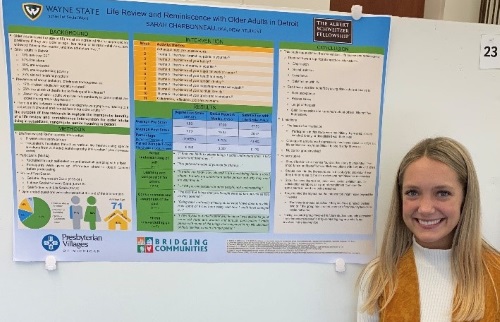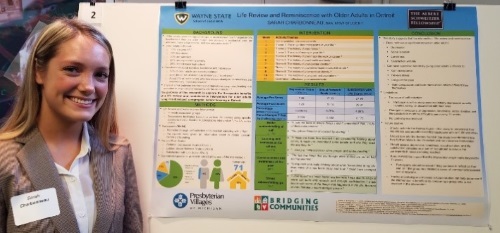MSW student wins award in Wayne State Research Symposium for study on older adults in Detroit

Sarah Charbonneau, a second-year student in Wayne State's Master of Social Work program, earned second place in the 2019 Wayne State Graduate and Postdoctoral Research Symposium held on March 5. First, second, and third place awards were given, with two students tied for second place and five students tied for third. Of these, Charbonneau was the sole representative for the School of Social Work.
Charbonneau competed against 170 other masters and doctoral students from across Wayne State at the annual symposium, with her poster "Life Review and Reminiscence with Older Adults in Detroit". Charbonneau's winning poster detailed the results of a 200-hour service learning project with four groups of older adults living in congregate senior housing in Detroit. In conjunction with community partners Bridging Communities Inc. and Presbyterian Villages of Michigan, Charbonneau gathered data and met with the three groups serving 21 older adults in Detroit over an 11-week period as part of her recently completed 2018-19 Albert Schweitzer Fellow award from the fellowship's Detroit Chapter. The 12-month fellowship was administered by Authority Health (formally the Detroit Wayne County Health Authority) and prepares professionals to serve and empower vulnerable people to live healthier lives and create healthier communities.
With guidance from faculty mentor Associate Social Work Professor Tam Perry, an award-winning gerontologist, Charbonneau has facilitated structured life review and reminiscence based on life themes and guiding questions centered on family, gender, work, death spirituality, health, and goals. As part of the study, Charbonneau assessed symptoms of depression, social isolation, loneliness, and life satisfaction at the beginning and at the end of the 11 weeks and posed open-ended questions to gain a better understanding of the benefits of life review and reminiscence with others. As group session passed, Charbonneau watched the members transition from being unsure and uneasy, to slowly sharing who they were with others, to expressing the feelings of safety and trust in the group. Throughout the weeks, members told stories of the most joyful moments in their lives from getting married to a beautiful spouse, moving into their first home, spending their first paycheck and even having their first child. Other weeks were not so joyful - some older adults told stories about how a parent died at a young age, how they felt like the black sheep in their family, and how they didn't understand why they were chosen to be drafted into the military when they valued education and had the goal to become a doctor. After evaluating indicators before and after the 11-week groups, depression scores decreased, social networks increased, and satisfaction with life also increased. More importantly, about 80% of the older adults explained that they understood themselves better and about 70% expressed that they were more aware of their past and had more compassion for others different from themselves after participating in the groups. One participant said "It gave me a relief. There were things that I wanted to say but I was unable to say until the group, and it made me feel good." Another said "I think the group made me brighten up my day and made my week and weekends better. I enjoyed the groups so much that they became very important. It made me feel better."
 After hearing and seeing the positive impact the group had on participants, Charbonneau sought to find a way to make the project sustainable and reached out to the participating community partners for support. There is now a plan in place to incorporate the groups into future social work intern's learning plans. Charbonneau was also able to sustain a group with the second community partner agency by having an older adult resident run the groups. Charbonneau noted, "As I look toward the future, I hope to see this project scale. I project this will come from the older adult's themselves as they truly see and believe in the impact this 11-week life review group has made on themselves and their relationships with others."
After hearing and seeing the positive impact the group had on participants, Charbonneau sought to find a way to make the project sustainable and reached out to the participating community partners for support. There is now a plan in place to incorporate the groups into future social work intern's learning plans. Charbonneau was also able to sustain a group with the second community partner agency by having an older adult resident run the groups. Charbonneau noted, "As I look toward the future, I hope to see this project scale. I project this will come from the older adult's themselves as they truly see and believe in the impact this 11-week life review group has made on themselves and their relationships with others."
In support of the School's mission to conduct and disseminate research relevant to our urban population for the betterment of individuals and our community, Charbonneau also presented her work at the Wayne State Institute of Gerontology Lifespan Alliance Research Day held on March 1st.
Charbonneau noted a favorite quote of Albert Schweitzer that reflects her award and future projects, "Success is not the key to happiness. Happiness is the key to success. If you love what you are doing, you will be successful."